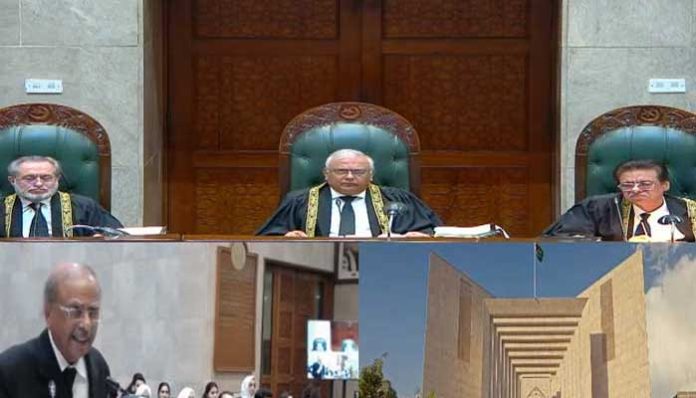ISLAMABAD: Supreme Court’s Justice Jamal Khan Mandokhail on Thursday said whether willingly or not, the apex court’s judges have accepted the 26th Constitutional Amendment.
Justice Mandokhail’s remarks came during the hearing of multiple pleas filed against the contested constitutional tweaks passed by parliament last year in October.The case, live-streamed on the SC YouTube channel, was heard by an eight-member constitutional bench led by Justice Amin-ud-Din Khan, which also includes Justice Muhammad Ali Mazhar, Justice Ayesha A Malik, Justice Syed Hasan Azhar Rizvi, Justice Musarrat Hilali, Justice Naeem Akhter Afghan and Justice Shahid Bilal Hassan.Multiple parties, including Pakistan Tehreek-e-Insaf (PTI), Jamaat-e-Islami (JI), Sunni Ittehad Council (SIC), as well as various bar associations and former presidents of the Supreme Court Bar Association (SCBA), had challenged the amendment back in October 2024.
The tweaks in the constitution, which have since come into effect, require the legislature to pick the chief justice, fixing the top judge’s tenure, and forming constitutional benches.
During the hearing today, Balochistan High Court Bar Association (BHCA) Munir A Malik adopted LHCBA lawyer Hamid Khan’s arguments, presented on Wednesday, and noted that the full court existed even before the amendment.
Urging that a bench comprising all SC judges should hear the case, the lawyer said that the constitutional bench possessed the necessary judicial powers and that anyone can issue a judicial order and there’s no hurdle preventing it.
With Justice Amin-ud-Din noting that the issue of the court’s jurisdiction falls within the merits of the case, Justice Ayesha questioned whether a full court could be formed in light of the 26th Amendment.
To this, lawyer Malik said that he considered the constitutional bench as one that of the SC itself and contended that the court was not deprived of its jurisdiction via the amendment and that the Judicial Commission of Pakistan (JCP) can nominate any judge.
“Whether a bench is constitutional or otherwise, the existing one has the [necessary] judicial powers,” the counsel remarked, adding that the judicial committee could constitute any bench that it wants.
Responding to the lawyer, Justice Hilali inquired how the existing bench could decide on its own jurisdiction.
“Judges who were promoted after the 26th Constitutional Amendment should not sit on the bench,” Justice Hilali said.
Reacting to the remarks, Justice Mandokhail questioned whether the new judges were brought from another country.
Speaking on the occasion, Justice Mazhar noted that the new judges, promoted to the SC, had nothing to do with the amendment and that the four new judges have served as the chief justices of high courts.
Clarifying her statement, Justice Hilali said that her remarks did not entail any malicious intention.
“All judges are honourable and should not be dragged [in this matter],” remarked Justice Mandokhail, recalling that he and the chief justice of Pakistan (CJP) had called for inclusion of all judges in the constitutional bench during every JCP meeting.
After Malik, lawyer Abid Zuberi, representing six former presidents of the Supreme Court Bar Association (SCBA), presented his arguments before the court and contended that it was not necessary for all judges to sit on the bench in a full court.
The available judges can also fulfill the quorum in a full court, he noted.
When asked to whom the bench should ask to form a full court, Zuberi said that the bench will direct the SC’s Practice and Procedure Committee.
“The Practice and Procedure Committee [constituted] before the enactment of the 26th Constitutional Amendment will form a full court,” the counsel said.
The court, after hearing the arguments, adjourned the hearing till Monday next week.

















